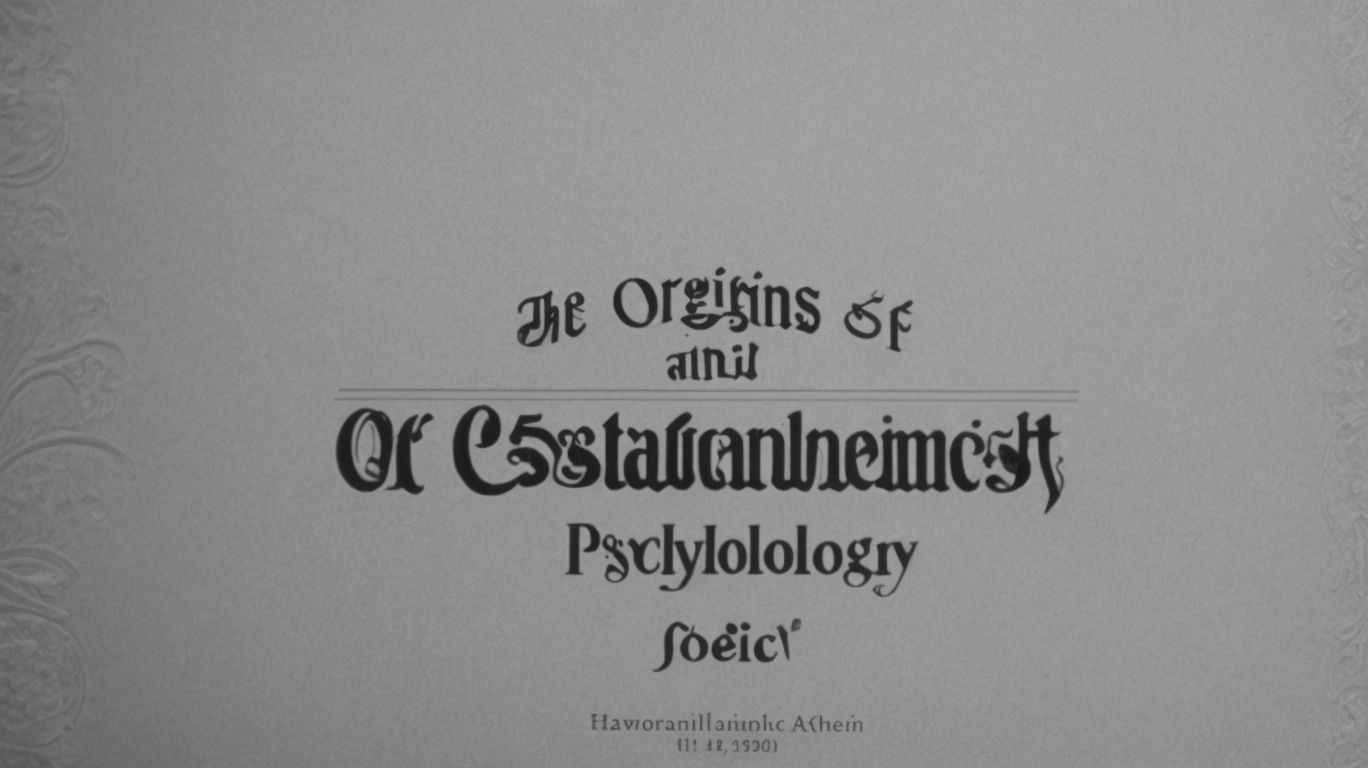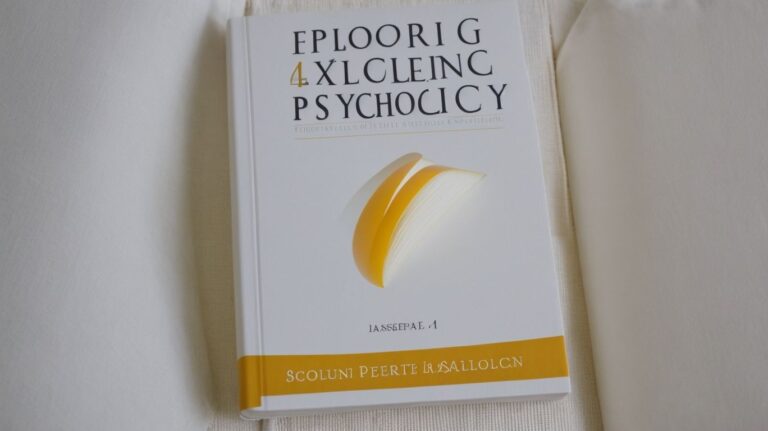Have you ever wondered about the origins of psychology and how it has evolved over time? In this article, we will explore the early beginnings of psychology, from ancient philosophers to the establishment of psychology as a science.
We will also delve into the key figures who shaped the field, such as Wilhelm Wundt, William James, Sigmund Freud, John B. Watson, and B.F. Skinner. Join us as we uncover the fascinating journey of psychology and its various perspectives.
Contents
- 1 What Is Psychology?
- 2 Who Is Considered the Father of Psychology?
- 3 What Are the Early Origins of Psychology?
- 4 When Was Psychology Established as a Science?
- 5 How Did Psychology Evolve Over Time?
- 6 Frequently Asked Questions
- 6.1 What is the significance of understanding the origins and establishment of psychology?
- 6.2 When and where did psychology first begin?
- 6.3 Who are some of the key figures in the establishment of psychology?
- 6.4 How did psychology evolve from its early beginnings?
- 6.5 What were the main events that led to the establishment of psychology as a discipline?
- 6.6 How has the understanding of psychology changed over time?
What Is Psychology?
Psychology is the scientific study of the mind, brain, and behavior, encompassing a rich history intertwined with philosophy and physiology.
Rooted in ancient Greek philosophy and further developed during the Renaissance and Enlightenment periods, psychology aims to unravel the complexities of human thought processes, emotions, and actions. Understanding human behavior has been pivotal in exploring consciousness, perception, memory, and mental health. Through the lenses of various theoretical frameworks, including psychoanalysis, behaviorism, and cognitive psychology, psychologists seek to decipher the intricacies of the human psyche and its manifestations in everyday life.
Who Is Considered the Father of Psychology?
Wilhelm Wundt is often regarded as the father of psychology for establishing the first experimental psychology laboratory in 1879.
His pioneering work marked a significant shift in the field of psychology, moving it towards a more scientific approach. Wundt’s laboratory, located at the University of Leipzig, provided a structured environment for conducting experiments to study human behavior and consciousness.
His focus on introspection and observation laid the foundation for modern psychology, emphasizing the importance of systematic study and empirical data. Wundt’s research on sensation, perception, and reaction time contributed greatly to the understanding of mental processes.
What Are the Early Origins of Psychology?
The early origins of psychology can be traced back to ancient philosophers’ contemplations on consciousness and perception, with notable influences from thinkers like John Locke and Thomas Reid.
These philosophical inquiries into the complexities of human thought sparked a wave of intellectual curiosity that eventually paved the way for the emergence of psychology as a distinct field of study.
John Locke, known for his theories on the mind as a blank slate, and Thomas Reid, who emphasized direct perception and common sense, laid a strong foundation for understanding the workings of the human mind.
The early intersections of psychology with philosophy reveal a symbiotic relationship between these disciplines, each influencing and enriching the other’s perspectives on the nature of consciousness and perception.
Ancient Philosophers
Ancient philosophers laid the groundwork for psychology by pondering the nature of consciousness, the mind, and human behavior.
Early philosophical inquiries into the complexities of human existence and behavior date back to civilizations of ancient Greece and beyond. Influential figures such as Aristotle, Plato, and Socrates delved into questions concerning the origins of consciousness, the relationship between mind and body, and the innate motivations driving human actions.
These foundational ideas set the stage for the eventual emergence of psychology as a formal field of study, providing critical insights that would shape the course of psychological thought for centuries to come.
Early Studies of the Mind and Behavior
Early investigations into the mind and behavior paved the way for the emergence of experimental psychology as a distinct scientific discipline.
Philosophical musings on human nature and consciousness had long intrigued scholars and thinkers, with early Greek philosophers such as Aristotle and Plato pondering the nature of the mind. These abstract discussions slowly transitioned into more empirical observations during the Renaissance period when figures like Galileo and Descartes started to emphasize the importance of observation and experimentation in understanding the complexities of human behavior. The pivotal moment came in the 19th century with Wilhelm Wundt, often referred to as the ‘father of experimental psychology’, who opened the first psychological laboratory in Leipzig, Germany in 1879. This marked the formal beginning of experimental psychology as a field that utilized controlled experiments to study mental processes and behavior.
When Was Psychology Established as a Science?
Psychology was established as a science with the advent of experimental psychology in the late 19th century, pioneered by Wilhelm Wundt and later advanced by Edward Titchener.
These trailblazers embraced the thought that human behavior and consciousness could be studied and understood through rigorous scientific methods. Wundt’s establishment of the first experimental psychology lab in Leipzig, Germany, marked a turning point, emphasizing the importance of controlled observation and precise measurement in psychological research. Titchener, a prominent figure in the structuralist school of psychology, further refined experimental techniques, focusing on introspection and the study of sensory experiences.
Wilhelm Wundt and Structuralism
Wilhelm Wundt laid the groundwork for psychology’s structuralist approach, emphasizing introspection as a key method to understand the structure of consciousness.
Wundt’s focus on introspection involved having individuals describe their own thoughts, feelings, and sensations in reaction to specific stimuli, aiming to break down consciousness into its elemental components.
This attention to internal experiences marked a shift in how psychological processes were studied, paving the way for a more systematic analysis of mental phenomena.
His work not only influenced the development of experimental psychology but also sparked debates and inquiries about the validity and reliability of introspection as a scientific method.
William James and Functionalism
William James revolutionized psychology with his functionalist approach that focused on understanding consciousness’s adaptive functions and the role of behavior in shaping mental processes.
James’s emphasis on functionalism highlighted the importance of how individuals’ thoughts, emotions, and behaviors serve a purpose in adaptation and survival. His work challenged the prevailing structuralist approach by suggesting that understanding the ‘why’ of mental processes was just as critical as understanding the ‘what.’
James explored the interconnectedness of behavior, cognition, and evolutionary perspectives, arguing that mental functions are not isolated phenomena but are deeply intertwined with our biological and environmental contexts.
Sigmund Freud and Psychoanalysis
Sigmund Freud revolutionized psychology with his psychoanalytic theory, looking into the complexities of the unconscious mind and its impact on behavior and mental health.
Freud’s theories on psychosexual development proposed that early childhood experiences greatly shape adult personality and behaviors, highlighting the stages of oral, anal, phallic, latent, and genital development. He emphasized the importance of resolving conflicts at each stage to avoid fixation or unresolved issues later in life.
Freud’s approach to therapy, commonly known as psychoanalysis, involved exploring patients’ unconscious thoughts and feelings through techniques like dream analysis and free association. This method aimed to bring repressed memories and emotions to the surface, allowing individuals to gain insight into their behavior and address unresolved issues for improved mental well-being.
John B. Watson and Behaviorism
John B. Watson spearheaded the behaviorist movement in psychology, emphasizing observable behavior as the primary focus of study and challenging traditional notions of the mind and nature versus nurture debates.
Watson’s emphasis on observable behavior marked a significant shift away from introspection and subjective experiences that were common in psychology at that time. His stimulus-response associations framework posited that behaviors could be understood and predicted through environmental stimuli and subsequent responses. This approach revolutionized psychological research, paving the way for experimental methods and rigorous scientific inquiry into human behavior.
The nature versus nurture debate also played a crucial role in Watson’s work, as he argued that behavior is primarily shaped by environmental factors rather than innate tendencies. This perspective challenged prevailing views on genetic determinism and underscored the importance of external influences in shaping an individual’s actions and development.
B.F. Skinner and Operant Conditioning
B.F. Skinner expanded behaviorism through his work on operant conditioning, demonstrating how reinforcement and punishment shape behavior and mental processes.
Skinner’s theory of operant conditioning focused on the idea that behavior is influenced by consequences. Through his research, he illustrated how positive reinforcement, such as rewards or praise, can increase the likelihood of a behavior being repeated. Conversely, negative reinforcement involves the removal of an unfavorable stimulus to strengthen a behavior.
Skinner’s exploration of punishment highlighted how the application of aversive consequences decreases the likelihood of a behavior occurring again. This concept, along with the principles of reinforcement, formed the basis of Skinner’s approach to understanding and modifying behavior.
How Did Psychology Evolve Over Time?
Psychology has evolved over time into a diverse field encompassing various specialty areas, drawing from eclectic theoretical backgrounds to understand human behavior and mental processes.
The roots of psychology can be traced back to ancient philosophical traditions, where thinkers like Aristotle pondered the intricacies of the mind and behavior. The late 19th and early 20th centuries saw the formalization of psychology as a distinct scientific discipline, with pioneers such as Wilhelm Wundt establishing the first laboratory for experimental psychology in Leipzig, Germany. From there, psychology evolved rapidly, branching into specialized areas such as clinical psychology, cognitive psychology, and neuropsychology, each offering unique insights into the complexities of the human mind. Today, the field of psychology continues to expand, embracing a wide range of theoretical frameworks and methodologies to approach the study of human behavior and mental health.
The Humanistic Perspective
Humanistic psychology emphasizes the individual’s self-actualization and the hierarchy of needs as key drivers of human behavior and personal growth.
This branch of psychology underscores the importance of individuals striving towards realizing their full potential, aligning with Abraham Maslow‘s theory on the hierarchy of needs, suggesting that individuals progress through five levels of needs starting from basic physiological needs to self-actualization.
The concept of self-actualization is central in humanistic psychology, referring to the realization of one’s creative, intellectual, and social potential to achieve personal growth and fulfillment, reflecting a deep-rooted belief in the inherent goodness and motivation for growth within individuals.
The Cognitive Revolution
The cognitive revolution in psychology shifted focus to mental processes like perception, memory, and decision-making, underlining the importance of internal cognitive functions.
During this period, psychologists began delving deeper into how individuals process information, make judgments, and solve problems, marking a departure from traditional behaviorism.
- One of the pioneers of cognitive psychology, Ulric Neisser, emphasized the role of mental structures in shaping behavior, paving the way for a more nuanced understanding of human cognition.
- Researchers in this field have explored areas such as attention, language acquisition, and problem-solving strategies, shedding light on the intricate workings of the mind.
This shift in perspective has significantly impacted various domains, from education to clinical practice, by offering insights into how cognition influences behavior and mental health.
The Biological Perspective
The biological perspective in psychology explores the influence of biological factors, brain structures, and sensory experiences on behavior and mental processes, reflecting the integration of biology and psychology.
Biological psychology, also known as biopsychology or psychobiology, delves into how genetic inheritance, neural pathways, and neurotransmitters affect human behavior. By studying the brain’s intricate networks and examining the impact of hormones on emotions and motivations, researchers gain insights into the biological underpinnings of psychological phenomena.
The biopsychosocial approach emphasizes the importance of considering not only biological influences but also psychological and social factors in understanding the complexity of human behavior. By recognizing the interconnectedness of these factors, psychologists can offer a more comprehensive perspective on mental health and well-being.
The Sociocultural Perspective
The sociocultural perspective in psychology emphasizes the impact of social influences, cultural norms, and societal contexts on individual behavior and psychological processes.
As we delve deeper into this perspective, it becomes evident that individuals are not isolated beings but are profoundly shaped by their social environments.
From childhood, people internalize the values, beliefs, and behaviors prevalent in their society, creating a cultural framework that influences their cognition and emotions.
Societal structures and institutions play a crucial role in defining the opportunities and constraints individuals face, significantly impacting their development and well-being. Examining mental health through a sociocultural lens offers a more holistic understanding, recognizing the interconnectedness between psychology and society.
The biopsychosocial approach in psychology integrates biological, psychological, and social factors to understand the complex interplay between nature and nurture in human behavior and mental health.
By considering the biological aspects, such as genetics, brain structure, and neurotransmitters, psychologists can delve into how our physical makeup influences our behavior and mental processes.
On the psychological front, factors like cognitive processes, emotions, and beliefs play a significant role in shaping individual differences and responses to stimuli.
In terms of the social dimension, societal norms, cultural influences, family dynamics, and social support systems all contribute to our development and well-being.
Frequently Asked Questions
What is the significance of understanding the origins and establishment of psychology?
Understanding the origins and establishment of psychology helps us to gain a deeper understanding of the field and its development over time. It also allows us to appreciate the contributions of notable figures and how their theories shaped modern psychology.
When and where did psychology first begin?
Psychology as a formal discipline dates back to 1879, when Wilhelm Wundt established the first psychological laboratory in Leipzig, Germany. However, the roots of psychology can be traced back to ancient civilizations such as Egypt, Greece, and China.
Who are some of the key figures in the establishment of psychology?
Some of the key figures in the establishment of psychology include Wilhelm Wundt, Sigmund Freud, William James, and Ivan Pavlov. These pioneers laid the foundation for modern psychology through their theories and experiments.
How did psychology evolve from its early beginnings?
Psychology has undergone significant changes and developments since its early beginnings. It has expanded to include various subfields such as developmental, social, and cognitive psychology. It has also incorporated new methodologies and technologies for research and analysis.
What were the main events that led to the establishment of psychology as a discipline?
The establishment of psychology as a discipline was influenced by several key events, including the founding of the first psychological laboratory, the publication of influential books such as William James’ “Principles of Psychology”, and the shift towards a more scientific approach to studying the mind and behavior.
How has the understanding of psychology changed over time?
The understanding of psychology has evolved over time, from early beliefs that the mind and behavior were controlled by supernatural forces to the modern scientific approach that emphasizes empirical evidence and research. It has also become more inclusive, recognizing diversity and individual differences in human behavior.




